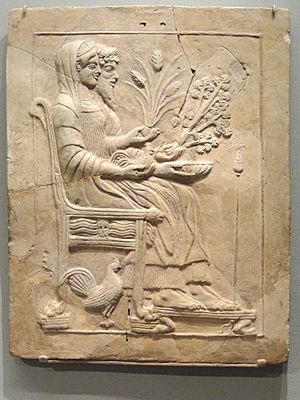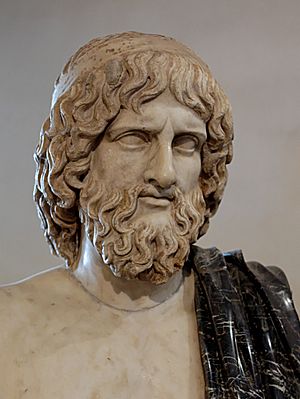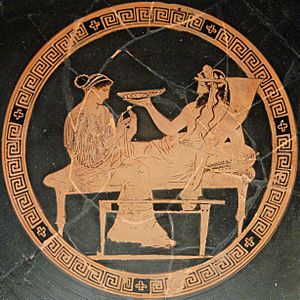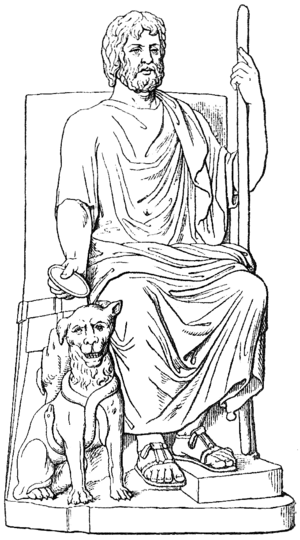Hades facts for kids
Quick facts for kids Hades |
|
|---|---|
|
|
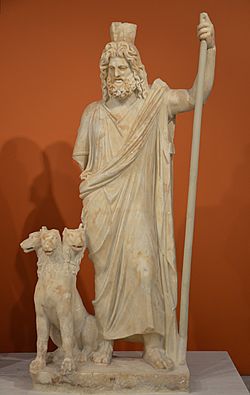
Hades/Serapis with Cerberus, mid-2nd century AD statute from the Sanctuary of the Egyptian Gods at Gortyna
|
|
| Abode | Greek underworld |
| Symbol | Cornucopia, Cypress, Narcissus, keys, serpent, mint plant, white poplar, dog, pomegranate, sheep, cattle, screech owl, horse, chariot |
| Personal information | |
| Consort | Persephone |
| Children | Macaria, and in some cases Melinoë, Zagreus and the Erinyes |
| Parents | Cronus and Rhea |
| Siblings | Poseidon, Demeter, Hestia, Hera, Zeus; Chiron (half) |
| Roman equivalent | Pluto (via Dis Pater/Orcus merger) |
Hades is a powerful god in Greek mythology. He was the oldest son of the mighty Titans Kronos and Rhea (mythology). Hades is known as the god of the Greek underworld, which is the realm where souls go after death. In Roman mythology, he is called Pluto. As Pluto, he was also seen as the god of wealth and riches.
Hades is the brother of famous gods like Zeus, Poseidon, Hestia, Hera, and Demeter. He has a loyal, three-headed dog named Cerberus, who guards the entrance to the Underworld.
Contents
Who is Hades in Greek Mythology?
In Greek mythology, Hades was the first-born son of the powerful Titans Kronos and Rhea (mythology). He had three older sisters: Hestia, Demeter, and Hera. He also had a younger brother, Poseidon. Their father, Kronos, swallowed all of them as soon as they were born. Only their youngest brother, Zeus, escaped this terrible fate.
When Zeus grew up, he forced Kronos to bring his siblings back up. After they were free, the six younger gods, along with their friends, fought against the older Titans. This huge war was called the Titanomachy. It lasted for ten years. The younger gods finally won the war.
After their victory, Hades and his two brothers, Poseidon and Zeus, drew lots to decide which part of the world each would rule. Zeus received the sky, Poseidon got the seas, and Hades was given the Greek underworld. This unseen realm is where the souls of the dead go. It also includes everything beneath the earth.
Hades: King of the Underworld
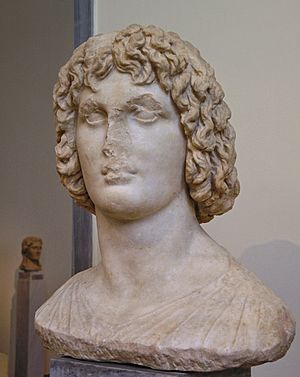
Even though death can seem scary, Hades was not usually seen as an evil god. He ruled over the dead and rarely left his dark kingdom. He did not care much about what happened in the world above. His main job was to make sure that no one ever left his domain.
Hades strictly forbid anyone from leaving his realm. He would get very angry if someone tried to escape. He also became furious if anyone tried to steal souls from his kingdom. His anger was just as strong for anyone who tried to trick death.
The Abduction of Persephone
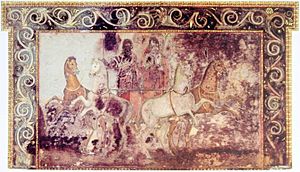
Hades' wife was Persephone, the daughter of Zeus and Demeter. Hades took Persephone while she was picking flowers in the fields of Nysa. Demeter, Persephone's mother, was very upset by this. She put a curse on the land, causing a great famine.
Other gods asked Demeter to lift the curse so that people would not die. But Demeter said the earth would stay barren until she saw her daughter again. So, Zeus sent his son, Hermes, to the underworld. Hermes was told to convince Hades to let Persephone return to Earth.
Hermes went to Hades' realm and found Hades and Persephone together. Hermes told Hades Zeus's message, and Hades agreed. Before Persephone left, Hades secretly gave her a pomegranate seed to eat. Hermes then took Persephone back to Earth, where Demeter was waiting.
Demeter and Persephone were very happy to be reunited. However, Demeter suspected that Persephone might have eaten something in the underworld. Eating food in the underworld would bind her to that realm. Persephone admitted that Hades had given her a pomegranate seed and made her eat it.
Because Persephone ate the pomegranate seed, she was bound to Hades and the underworld. This made Demeter very sad. Zeus, however, had a plan that everyone agreed to. Persephone would spend one-third of the year with Hades in the underworld.
When Persephone is in the underworld with Hades, winter comes to Earth. This time is seen as a period of sadness and mourning for Demeter.
Famous Visitors to the Underworld
Many heroes and mortals visited Hades' realm. Here are a few stories:
Orpheus's Journey
The hero Orpheus once went into the underworld. He was looking for his wife, Eurydice, who had died from a snake bite. Orpheus played such beautiful music that it charmed Hades and Persephone. They allowed him to take Eurydice back to the land of the living. But there was one rule: he could not look back at her on his way out.
Sisyphus's Punishment
Sisyphus was a king from Corinth. He was punished in Tartarus, a deep part of the underworld. He had told the river god Asopus where Zeus had taken his daughter. Sisyphus also tried to trick death. Zeus sent Thanatos (Death) to Sisyphus, but Sisyphus cleverly trapped Thanatos. As a result, no one could die until Ares freed Thanatos.
Sisyphus was eventually brought to Hades. But before he died, Sisyphus told his wife not to perform any funeral rites for him. When Hades found out, he allowed Sisyphus to return to the living world to punish his wife. Sisyphus promised to return, but he never did until he died of old age years later. Hades punished Sisyphus by making him roll a huge boulder up a hill in the underworld. But every time he reached the top, the boulder would roll back down. He had to do this forever.
Hades' Worship and Symbols
Hades was the god of the dead, and people who were still alive found him scary. They did not want to meet him, so they were careful not to swear oaths in his name. They would also turn their faces away when making sacrifices to him. Many people were afraid to even say the word "Hades." So, they used other names for him, like "Pluto," which means "the wealthy one."
Hades spent most of his time in his dark kingdom. He was a strong fighter and showed his power in the famous Titanomachy. This battle between the Olympians and the Titans established Zeus's rule.
Even though he was feared and disliked, Hades was not an evil god. He was stern, strict, and unpitying, but he was also fair.
When Greeks prayed to Hades, they would bang their hands on the ground. They did this to make sure he would hear them. Black animals, like sheep, were sacrificed to him.
One ancient story says that Hades had a special Cap of invisibility. His chariot, pulled by four black horses, was a fearsome sight. Other symbols linked to Hades include the narcissus and cypress plants, the Key of Hades, and his three-headed dog, Cerberus. Sometimes, snakes were also shown with Hades in his pictures.
See also
 In Spanish: Hades para niños
In Spanish: Hades para niños
- Angra Mainyu
- Ereshkigal
- Ghosts in Mesopotamian religions
- Irkalla
- Last Judgment
- Osiris
- Saveasi'uleo
- Shiva
- The Golden Bough (mythology)
- Yama (East Asia)
- Pluto
- Varuna
Images for kids
-
Hades abducts Persephone, pot made and found in Taranto, 350-325 BC
-
The Abduction of Persephone by Pluto, Amphipolis, Greece.


